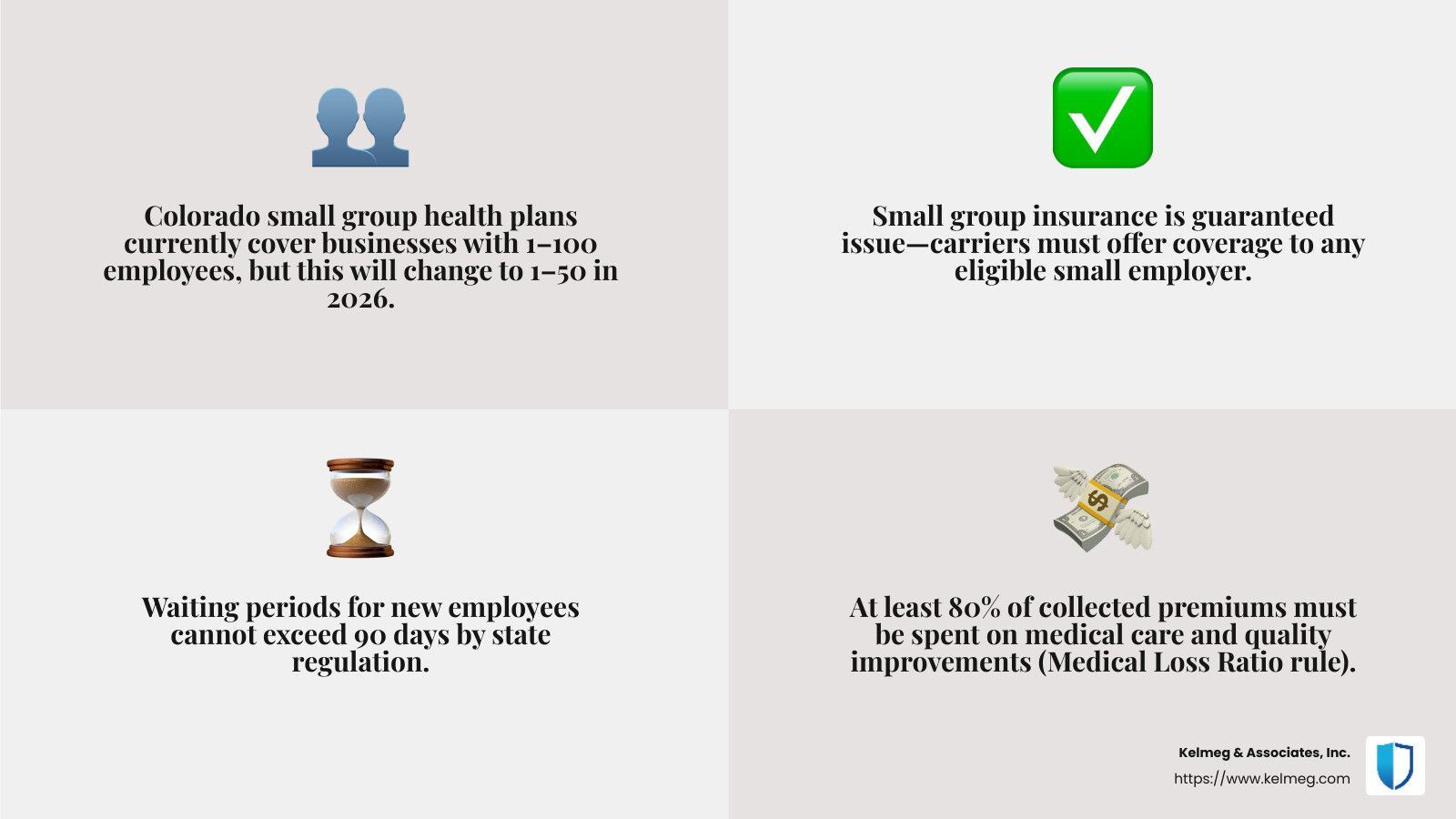Understanding the Rules: Colorado's Small Group Health Insurance
Navigating small business health insurance can feel like trying to solve a puzzle with constantly changing pieces. As a Colorado small business owner, you're not just running a company—you're also responsible for helping your team access affordable healthcare. That's where understanding colorado small group health insurance regulations becomes essential.
Whether you're offering coverage for the first time or reviewing your existing benefits package, the regulations that govern small group insurance in Colorado directly impact what you can offer, how much it costs, and who qualifies. The good news? You don't have to figure it all out alone.
In Colorado, small group health insurance currently applies to businesses with 1-100 employees, though this definition will change to 1-50 employees starting January 2026 (with helpful grandfathering provisions we'll explain later). For eligible businesses, carriers must issue coverage under guaranteed issue protections, though you'll typically need at least 70% of your eligible employees to participate and contribute at least 50% toward employee premiums.
The waiting period for new employees can't exceed 90 days, and carriers must spend at least 80% of premium dollars on actual medical care rather than administrative costs—a rule known as the Medical Loss Ratio that can even result in premium rebates for your business.
For smaller businesses with fewer than 50 full-time equivalent employees, offering health insurance remains optional but comes with potential tax advantages that could benefit your bottom line. Larger businesses approaching or exceeding 50 full-time equivalents need to be mindful of ACA employer mandate requirements to avoid penalties.
At Kelmeg & Associates, we've guided countless Colorado businesses through these regulations to find coverage that works for both their employees and their budget. We understand that behind every policy decision is a team of real people with healthcare needs and concerns.

In this guide, we'll walk you through everything you need to know about colorado small group health insurance regulations—from eligibility requirements to premium setting, from compliance obligations to benefit design options. We'll explain how recent legislative changes might affect your coverage, what protections exist for both employers and employees, and how to make the most of available tax credits and financial assistance.
By the time you finish reading, you'll have a clear roadmap for navigating Colorado's small group health insurance landscape with confidence. Let's get started with the basics: understanding exactly what qualifies as a "small group" in Colorado.
What Qualifies as a "Small Group" in Colorado?
Current 1-100 Employee Standard
Right now in Colorado, if you own a business with anywhere from 1 to 100 employees, you're considered a small employer for health insurance purposes. This matches the Affordable Care Act (ACA) definition, though states do have some flexibility in how they define their small group markets.
Figuring out your exact business size isn't just about counting heads. You'll need to calculate your full-time equivalent (FTE) employees, which takes into account both full-time and part-time workers.
The math is pretty straightforward: Each employee working 30+ hours weekly (or 130+ hours monthly) counts as 1 FTE. For your part-timers, add up their monthly hours (capping each at 120 hours), divide by 120, and you'll get their FTE count. Add both numbers together, and that's your total FTEs.
I recently worked with a bakery owner in Lafayette who was surprised to find that her business—with 12 full-timers and 8 part-timers—actually qualified as a small group with just 16 FTEs after doing the calculation. This opened up insurance options she hadn't realized were available to her!
2026 Shift to 1-50 Employees & Five-Year Grandfathering
A big change is coming to colorado small group health insurance regulations. Senate Bill 24-073 will change the definition of a small employer from 1-100 employees to 1-50 employees, starting January 1, 2026.
This change will bring Colorado in line with many other states that use the 1-50 employee definition. But don't worry if you're in that 51-100 employee range—the bill includes some helpful cushions for the transition:
First, there's a five-year grandfathering provision. If you have 51-100 employees and already have small group coverage before January 1, 2026, you can keep your small group plan for up to five more years.
Second, during this grandfathering period, you'll have some flexibility to change plans within one metal level up or down from your current coverage without losing your small group status.
Third, there's a premium protection built in. If an actuarial review shows that this change would increase premiums for most covered individuals by more than 3%, the change will be repealed.
As one of my clients in Boulder put it, "Having five years to adjust our benefits strategy gives us breathing room to make thoughtful decisions instead of rushing into new coverage options."
Why the Definition Matters for colorado small group health insurance regulations
Whether your business falls into the small group category has real implications for your health insurance options and obligations. Here's why it matters:
Guaranteed Issue Rights mean insurance companies must offer coverage to your small business regardless of your employees' health status. No one can be turned away because of pre-existing conditions.
Rating Rules for small groups mean premiums can only vary based on age, geographic location, family composition, and tobacco use—not on health status or previous claims. This often creates more predictable costs for small employers.
Essential Health Benefits must be covered by all small group plans, including the ten benefits mandated by the ACA plus Colorado-specific requirements like clinical trials, diabetes management, comprehensive maternity care, and anticancer medications.
Tax Credit Eligibility is available for very small businesses with fewer than 25 FTEs if they purchase coverage through Connect for Health Colorado and meet certain wage requirements. These credits can significantly reduce premium costs.
Employer Mandate Exemption means businesses under 50 FTEs don't face penalties for not offering health insurance, unlike their larger counterparts.
For many of the businesses we work with at Kelmeg & Associates, Inc., understanding these distinctions has led to significant savings. One manufacturing company in Colorado with 45 employees saved over $30,000 annually by properly classifying as a small group and accessing the appropriate plans.
We've helped countless businesses throughout Colorado steer these sometimes confusing regulations. Whether you're a startup in Boulder or an established business in Lafayette wondering how these rules apply to you, we're here to help you make sense of colorado small group health insurance regulations and find the best coverage for your team.
Colorado small group health insurance regulations: Core Rules, Coverage & Protections
Once you've figured out that your business qualifies as a small group, you'll need to understand the key rules that govern your health insurance options in Colorado. These regulations aren't just bureaucratic red tape - they're designed to protect both you and your employees while ensuring fair access to quality healthcare.

Guaranteed Issue, Waiting Periods & Participation
One of the cornerstones of colorado small group health insurance regulations is the guaranteed issue requirement. This is actually great news for small businesses! As outlined in Colorado Revised Statutes § 10-16-105:
"Each carrier that offers an individual health benefit plan in this state shall issue any applicable health benefit plan to any eligible individual who applies for the plan and agrees to make the required premium payments."
In plain English, this means insurance companies can't turn you down based on your employees' health conditions or your company's past claims. If you qualify as a small group and agree to pay the premiums, they must offer you coverage. This is a huge protection that wasn't always available before the ACA.
There are, however, a few conditions to be aware of:
Most carriers require at least 70% participation from your eligible employees. Don't panic though - employees who have coverage elsewhere (through a spouse's plan, Medicare, or Medicaid) typically don't count against this percentage.
As Maria, a coffee shop owner in Boulder told us, "I was worried we wouldn't meet the participation requirement with so many of my baristas being under 26 and still on their parents' plans. My advisor at Kelmeg explained that those employees don't count in the calculation, which was a huge relief!"
You also can't make new employees wait forever for coverage. colorado small group health insurance regulations cap waiting periods at 90 days maximum. Many businesses choose shorter timeframes like "first of the month following 30 days of employment" to help with recruitment.
While not technically required by law, most insurance carriers expect employers to contribute at least 50% toward employee-only premiums. Your contribution level can significantly impact employee participation and satisfaction, so it's worth considering carefully.
Continuation Coverage: Federal COBRA & Colorado Mini-COBRA
Life happens, and employees sometimes need to leave your company. Colorado small group health insurance regulations include important provisions for continuation coverage in these situations.
If your business has 20+ employees, you're subject to federal COBRA laws. This means you must offer continued health coverage to departing employees and their dependents for 18-36 months (depending on why they're leaving). The former employee pays the full premium plus a small administrative fee, but maintaining access to the group rate can be invaluable during career transitions.
Smaller businesses with fewer than 20 employees fall under Colorado's "mini-COBRA" law instead. This state-level protection provides similar continuation benefits for employees of smaller companies.
Tom, a hardware store owner in Lafayette, shared: "When my long-time manager decided to start his own business, I was glad we could offer him continuation coverage through Colorado's mini-COBRA. Kelmeg walked us through the notification process and made sure we did everything by the book. It gave both of us peace of mind during his transition."
The key with continuation coverage is proper notification - make sure you're providing the required notices to eligible employees within the specified timeframes to stay compliant.
Network Adequacy & Mental Health Parity Under colorado small group health insurance regulations
Two particularly important consumer protections within colorado small group health insurance regulations concern network adequacy and mental health coverage.
Insurance carriers in Colorado must maintain robust provider networks that ensure your employees can access care without unreasonable delays. The Division of Insurance evaluates networks based on geographic distribution, specialty mix, provider-to-member ratios, and emergency care access. They also consider cultural competency and language services - important factors in our diverse state.
When reviewing plans for your business, pay attention to whether the networks include providers near where your employees live and work. A plan with a great price but poor local coverage might end up costing more in the long run through employee dissatisfaction and missed work time.
Mental health parity is another critical protection in Colorado. Simply put, insurance plans must cover mental health and substance use disorder services at the same level as physical health services. This means no separate deductibles, equivalent copays, similar treatment limitations, and comparable provider networks for mental health care.
Sarah, an accounting firm owner in Adams County, noted: "The mental health parity requirements have been a lifesaver for our team, especially after the pandemic. Several employees have told me that having real coverage for therapy made all the difference during tough times. It's good business and the right thing to do."
The newer Colorado Option plans, available to small employers since 2024, take mental health coverage even further with $0 copays for mental health office visits. This is worth considering if mental health support is a priority for your workforce.
At Kelmeg & Associates, we've helped hundreds of Colorado businesses steer these regulations to find plans that protect both their bottom line and their employees' wellbeing. Understanding these core rules is the first step toward making informed decisions about your company's health benefits.
More info about Group Health Insurance Colorado
Setting & Reviewing Premiums: Rates, Rating Areas, MLR
Understanding how premiums are set and regulated is crucial for small businesses navigating colorado small group health insurance regulations. Colorado has established a robust framework for rate review, geographic rating, and medical loss ratio requirements.
How Colorado DOI Reviews and Approves Small Group Rates
When you're shopping for small group coverage, you might wonder how insurance carriers determine their rates. The Colorado Division of Insurance (DOI) plays watchdog in this process, reviewing and approving all small group health insurance rates before they hit the market.
This oversight helps ensure you're getting a fair deal. Insurance carriers must submit detailed actuarial analyses that justify their proposed rates, showing they're based on reasonable assumptions about medical costs and administrative expenses.
"Colorado's rate review process strikes a balance between ensuring carrier solvency and protecting consumers from unjustified premium increases," explained one insurance professional during a recent regulatory hearing.
The process includes a 60-day filing requirement, giving regulators enough time to review and potentially challenge any increases that seem excessive. This transparency extends to you as well—the DOI publishes these rate filings on its website, allowing for public comment.
When our clients at Kelmeg & Associates ask about rate increases, we're able to point them to these public filings to help explain the factors driving their premiums.
For the most current information on rate reviews, you can visit the federal rate review website.
Geographic Rating Areas & Age Bands Explained
If you've noticed that your friend's business in Grand Junction pays different premiums than your Denver-based company, there's a good reason for that. Under colorado small group health insurance regulations, premiums can vary based on where you're located and the ages of your employees—but never based on your team's health status or past claims.
Colorado divides the state into nine geographic rating areas, each with counties that have similar healthcare costs. This approach recognizes the real differences in medical costs between places like downtown Denver and rural communities on the Western Slope.
The nine areas include Boulder, Colorado Springs, Denver, Fort Collins, Grand Junction, Greeley, Pueblo, and two rural zones (East and West). A Colorado DOI study found that using a single statewide rate would actually harm rural areas by potentially reducing carrier participation where costs are already high.
Age is another factor that affects premiums. Colorado follows the federal age curve with 12 age bands, where the oldest adults (64+) cannot be charged more than three times what the youngest adults (21) pay.
For businesses with 10 or more enrolled employees, you may have a choice between composite rates (where everyone pays the same regardless of age) or age-banded rates (where premiums vary by age). When we work with clients at this size threshold, we often run the numbers both ways to see which approach benefits their specific employee demographics.
Tobacco use can also impact rates, with carriers allowed to apply up to a 15% surcharge for tobacco users—though many employers choose plans that don't include this adjustment.
Medical Loss Ratio Refunds & Employer Impact
Here's something many small business owners don't realize: insurance carriers are required to spend at least 80% of your premium dollars on actual medical care and quality improvements. This Medical Loss Ratio (MLR) requirement is one of the most consumer-friendly aspects of colorado small group health insurance regulations.
If your carrier doesn't meet this 80% threshold, they must issue refunds to policyholders. For small group plans, these rebates go to you as the employer.
A Broomfield business owner recently shared with us: "We received an MLR rebate of nearly $15,000 last year, which we used to reduce employee premium contributions for three months. It was an unexpected but welcome relief for our team."
When you receive an MLR rebate, you have several options. You can distribute it to current employees enrolled in the health plan, use it to reduce future premiums, or provide improved benefits. The key requirement is that you apply the rebate in a manner that's reasonable and benefits plan participants.
These rebates aren't just theoretical—they have real financial impact. In 2023 alone, health insurers in Colorado paid approximately $9.2 million in rebates to small group policyholders. That's real money back in the pockets of business owners and their employees.
At Kelmeg & Associates, we help our clients understand when rebates might be coming their way and the best ways to use those funds to benefit both the business and employees. This kind of practical advice is just one way we help Colorado businesses steer the complexities of small group health insurance.
Employer Responsibilities & Benefit Design Options
Navigating your responsibilities as an employer under colorado small group health insurance regulations can feel like trying to solve a puzzle with constantly changing pieces. But don't worry—understanding your obligations, exploring available plan options, and managing enrollment processes effectively can be simpler than you might think.

ACA Employer Mandate vs Small Employer Flexibility
The size of your business makes a big difference in what's required of you under colorado small group health insurance regulations.
If you have 50 or more full-time equivalent employees, you're subject to the ACA's employer mandate. This means you must offer "affordable" coverage to at least 95% of your full-time employees, and that coverage must provide "minimum value" (covering at least 60% of total costs).
Miss the mark, and you could face penalties of around $3,860 per employee who receives a premium tax credit. You'll also need to report your coverage offerings to the IRS each year.
But if you're a small employer with fewer than 50 FTEs, you can breathe easier. You're not required to offer health insurance at all, and you won't face penalties if you choose not to. This gives you tremendous flexibility in designing a benefits approach that works for your business.
As Maria, a Colorado Springs business owner with 45 employees, told me, "The flexibility afforded to small employers allowed us to design a benefits package that works for both our budget and our employees' needs. We don't feel pressured by potential penalties—instead, we can focus on what makes sense for our team."
Traditional Group Plans vs ICHRA/QSEHRA vs Colorado Option
Colorado small businesses have several paths to providing health benefits, each with its own advantages under colorado small group health insurance regulations.
With traditional group health insurance, you select one or more plans for all employees. You'll typically need to contribute 50-100% toward employee premiums, and you can find plans through Connect for Health Colorado or directly from carriers. These include familiar options like HMOs, PPOs, and high-deductible health plans paired with HSAs.
Individual Coverage Health Reimbursement Arrangements (ICHRAs) offer a different approach. Instead of choosing plans for your team, you reimburse employees tax-free for individual health insurance premiums. You can set different reimbursement amounts for different employee classes, and your team members purchase their own coverage on the individual market. There's no minimum or maximum contribution requirement, giving you complete flexibility.
For very small employers, Qualified Small Employer Health Reimbursement Arrangements (QSEHRAs) might be the right fit. Available only to employers with fewer than 50 FTEs who don't offer group health insurance, QSEHRAs allow tax-free reimbursement for individual health insurance premiums and qualified medical expenses. In 2024, contribution limits are $6,150 for self-only coverage and $12,450 for family coverage.
New to the scene are Colorado Option Plans, which became available to small employers on January 1, 2024. These standardized plans are offered by all carriers to small employers with 2-100 employees. They feature the same benefits across all insurance companies, making comparison shopping much easier. A big plus: they include $0 copays for primary care, mental health visits, and prenatal care.
Tom, a Lafayette small business owner who recently worked with us, shared: "After weighing our options with Kelmeg & Associates, we implemented a QSEHRA. This allowed our employees to select plans that best fit their individual needs while giving us predictable costs and administrative simplicity. It was a win-win."
Participation, Contribution & Enrollment Checklist
Successfully implementing a small group health plan means understanding three key requirements under colorado small group health insurance regulations: participation, contribution, and enrollment.
Most carriers require at least 70% of your eligible employees to enroll in your plan. The good news is that employees with other qualifying coverage (like a spouse's plan, Medicare, or Medicaid) don't count against your participation rate. Some carriers even offer an annual "relaxed participation" period, typically in December, when groups can enroll regardless of participation levels.
When it comes to contributions, most carriers require employers to contribute at least 50% of the employee-only premium. These contributions must be applied uniformly across all employees. Your contributions to premiums are tax-deductible business expenses, which can help offset the cost.
The enrollment process involves several important steps:
- Completing the employer application and eligibility verification
- Gathering employee enrollment forms (using the Colorado Employee Uniform Application)
- Defining your waiting period (which cannot exceed 90 days)
- Making your initial premium payment
- Distributing Summary of Benefits and Coverage (SBC) documents
- Notifying employees about their special enrollment rights
Don't forget about annual renewal considerations. You'll need to communicate rate changes to employees, provide an open enrollment period for plan changes, re-verify participation requirements, and update your employee census information.
As James, a Boulder employer, advised me, "Document everything in your enrollment process. We maintain a checklist for each employee to ensure we've met all notification requirements and deadlines. It saves us headaches down the road."
Tax Credits & Financial Assistance for Qualifying Employers
One of the best-kept secrets of colorado small group health insurance regulations is the availability of financial assistance for qualifying small businesses.
The Small Business Health Care Tax Credit can be a game-changer if you have fewer than 25 full-time equivalent employees with average annual wages under $56,000 per employee. If you contribute at least 50% of employee premium costs and purchase coverage through Connect for Health Colorado's Small Business Health Options Program (SHOP), you could receive a credit worth up to 50% of your premium contributions (35% for tax-exempt organizations).
Despite this valuable opportunity, recent data shows only about 23% of Colorado small businesses with fewer than 50 employees offer health coverage to their employees. Many are missing out on this helpful tax credit.
Sarah, an Adams County business owner, recently told me, "The small business tax credit reduced our effective premium costs by nearly 40%. Our advisor at Kelmeg & Associates helped us calculate our eligibility and maximize the credit amount. I can't believe more small businesses aren't taking advantage of this."
Colorado also offers specific assistance programs, including free help from certified brokers like us at Kelmeg & Associates. Some local chambers of commerce and business associations offer group purchasing arrangements, and the Colorado Option program aims to provide more affordable standardized plans.
Coordination of Benefits & Common Misconceptions
When employees have multiple sources of coverage, understanding how benefits coordinate becomes crucial under colorado small group health insurance regulations.
Coordination of Benefits (COB) determines which plan pays first when an individual is covered by more than one health plan. It prevents duplicate payments exceeding 100% of allowed expenses and follows the standardized "birthday rule" for determining primary coverage for dependents. Employees will need to disclose other coverage on claim forms.
I've found that small employers often have misconceptions about Colorado small group insurance. Let me clear up the most common ones:
"Small employers must offer health insurance." Not true! If you have fewer than 50 FTEs, you're not required to offer coverage under the ACA.
"All small group plans cost approximately the same." Actually, premiums can vary significantly based on geographic area, carrier, plan design, and employee demographics.
"Employers can reimburse employees for individual health insurance premiums without establishing a formal HRA." This is a dangerous misconception. Direct reimbursement without an ICHRA or QSEHRA violates ACA regulations and can result in penalties.
"Small group plans can exclude coverage for pre-existing conditions." Nope! All small group plans must cover pre-existing conditions from the first day of coverage.
"Employers must cover all employees or none." Not so. You can establish eligibility criteria based on job classification, hours worked, and length of employment, as long as these criteria are applied uniformly.
As Michael, a Colorado insurance professional, noted, "The most common confusion I see is around reimbursing for individual premiums. Many small employers don't realize they need a formal HRA structure to do this compliantly. It's an easy mistake that can lead to costly penalties."
At Kelmeg & Associates, we've guided countless Colorado small businesses through these complexities. We'd be happy to help you understand your options and responsibilitie
Conclusion & Next Steps
After exploring the ins and outs of colorado small group health insurance regulations, you might be feeling a bit overwhelmed - and that's completely normal! The regulatory landscape can seem like a maze, but with the right guidance, you can steer it successfully to provide valuable health benefits for your team.
At Kelmeg & Associates, Inc., we've walked this path with hundreds of Colorado businesses just like yours. We've seen how understanding these regulations can transform a confusing obligation into a strategic advantage for your company.
Let me share a quick story: A small tech startup in Boulder came to us frustrated after trying to figure out health insurance on their own. After we helped them understand their options under colorado small group health insurance regulations, they not only found a plan that saved them nearly $18,000 annually, but they also reported a 30% decrease in employee turnover the following year. As their founder told us, "Having competitive health benefits became our secret weapon for recruiting in a tight labor market."
Ready to take action? Here's a simple compliance roadmap to get you started:
First, calculate your full-time equivalent (FTE) employee count accurately. This single number determines which regulations apply to your business and opens (or closes) certain options. It's not just a headcount but a specific calculation that considers part-time workers too.
Next, take time to explore the full spectrum of options available to Colorado small employers. Whether it's a traditional group plan, an ICHRA arrangement, or one of the new standardized Colorado Option plans, each approach has distinct advantages depending on your workforce and budget.
Don't forget to check your eligibility for the Small Business Health Care Tax Credit if you have fewer than 25 FTEs. This often-overlooked benefit can significantly reduce your effective premium costs when you purchase through Connect for Health Colorado.
If you employ between 51-100 workers, start planning now for the 2026 small group definition change. With the five-year grandfathering provision, you'll have options - but only if you're prepared in advance.
Working with a broker who specializes in small group health insurance isn't just helpful - it's often essential. The regulations are complex and constantly evolving, and having an expert in your corner costs you nothing extra while potentially saving you thousands.
At Kelmeg & Associates, we pride ourselves on staying current with every nuance of colorado small group health insurance regulations so our clients don't have to. We serve businesses throughout Boulder, Lafayette, Broomfield, Adams County, and across Colorado with personalized guidance that goes beyond just explaining the rules.
Offering health insurance isn't merely about checking a compliance box. It's about investing in the wellbeing of your team and the future of your business. When done right, your health benefits program can become a cornerstone of your company culture and a powerful tool for attracting and keeping talented people.
Whether you're a startup looking to offer benefits for the first time or an established company reassessing your current strategy, we're here to help you make sense of Colorado's small group health insurance landscape with clarity and confidence.













